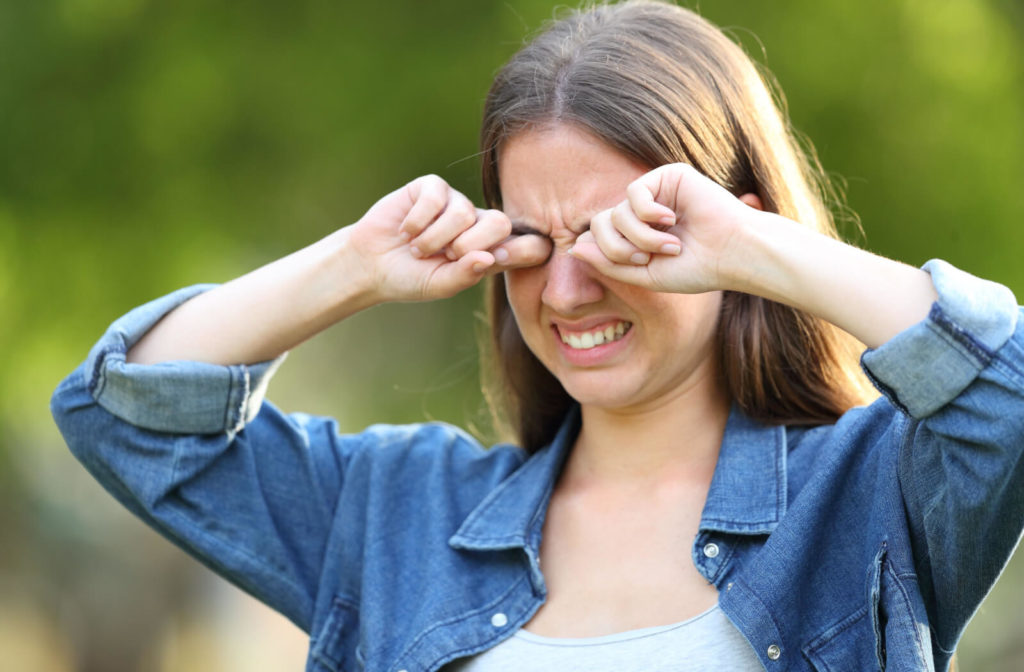Your eyes normally produce tears or moisture on a regular basis to stay lubricated. If you have a condition known as dry eye syndrome, your eyes may not produce adequate tears on a regular basis, leading to irritation and discomfort.
Most people with dry eyes will experience slight irritation but in more severe cases, dry eyes can lead to other conditions.
Some of the symptoms of dry eye are:
- Burning or stinging
- A gritty or scratchy feeling in the eye
- Sensitivity to light
- Redness in the eye
- Blurred vision
- Watering eyes
If left untreated, dry eyes can lead to chronic dry eye syndrome. Dry eyes can be distracting and uncomfortable but you are not alone—approximately 4.88 million people in the U.S. experience symptoms of dry eye.
Dry eyes happen when there is a disruption in the tear film. The tear film in your eyes is made up of 3 layers: fatty oils, mucus, and aqueous fluid. All of these layers function together to keep the surface of your eye lubricated, smooth, and clear. A disruption in any of these layers can cause dry eyes.
Why Do I Have Dry Eyes?
Many people in the U.S. experience symptoms of dry eye syndrome. While there are different signs, symptoms, and causes of dry eyes, the risk factors for dry eye syndrome can change depending on your age.
Potential causes for dry eyes are:
- Contact lenses
- Hormonal changes: a woman’s eye health can change due to pregnancy, birth control use, or menopause
- Computer use: eye strain and long periods of looking at a computer can cause your eyes to become dry.
- Indoor elements: heating and cooling elements such as air conditioning, ceiling fans, and changes in humidity
- Outdoor elements: living in higher altitude areas, windy conditions, and dry areas
- Smoking
- Medications and allergies: many medications can have side effects of dry eyes
- Being over the age of 50
Your eye doctor can evaluate your eyes to find out if you have dry eye syndrome or if your dry eyes are caused by environmental factors that can be changed. Lifestyle changes may also help improve your eye condition, which can be as simple as taking breaks more frequently when looking at screens for a long period of time.
Your eye doctor can fully assess your vision through a comprehensive eye exam to find out what the cause of your dry eyes could be, and help you choose the right treatment options for you.

What Can I Do to Fix My Dry Eyes?
If you are experiencing dry eye symptoms, or have been recently diagnosed with dry eye syndrome, options are available to ease your discomfort. There are many different treatments available to relieve your symptoms. While artificial tears are one method to help find relief throughout the day, there are other remedies you can ask your eye doctor about:
- In-office treatments: treatments your eye doctor can perform to help stimulate the glands and clean areas of your eye to increase tear production.
- Heat masks: these may reduce the redness from dry eyes with gentle compression and heat.
- Punctal plugs: small plugs can be inserted into your tear ducts. They help to prevent your tears from draining too quickly.
Is There a Cure for Dry Eyes?
Since dry eye syndrome can occur for a number of reasons, treatment options and opportunities for short or long-term relief will depend on the cause of your dry eyes.
If you have dry eyes due to an allergy or medication, it could clear up seasonally, or upon stopping the medication. Should you have a chronic condition or higher risks due to age, you may find treatments that will be able to significantly decrease your symptoms, or may require ongoing treatment.
Next Steps
Many people feel that their symptoms are worth mentioning to their doctors. If you feel that you might be at risk for dry eye syndrome or any other condition, or if you notice a change in your eye health, let your doctor know.
Dr. Nota at San Clemente Optometry is here to answer any questions and address concerns you may have. Book an appointment today to speak to Dr. Nota about dry eye syndrome and learn more about options for treatment.




